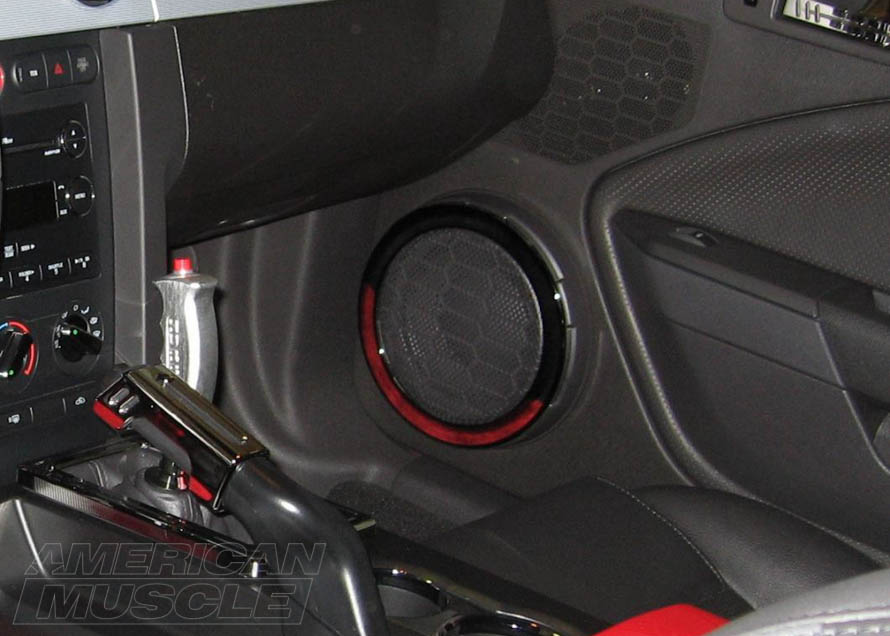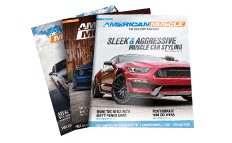Music is calming and it can help you focus as you take on the large circuit track ahead of you or as you gander out at the beautiful sites around you on the city and country streets. AmericanMuscle knows how important your 2015-2018 Mustang stereo and audio are and that is why we offer the best products and brand names in the industry to include Raxiom, JL Audio, Alterum, and more. You will find all of the products and accessories you need to take your stock radio from drab to fab in minutes. Some of the products on our site include base stereo systems, subwoofer upgrade kits, bass systems, and more. Many of the stereos we have to offer are easy to install in just minutes and can be used instantly. Don’t miss out on the opportunity to upgrade your stereo and improve the audio in your Mustang now.
Ford Mustang Sound Systems: Overview Guide

Driving a Mustang may already be a thrilling experience in itself. You’ve got killer looks, undeniable heritage, and an all American power plant pushing you to white-knuckled speeds as easy as pie. Even though the sound of the road may be an awesome sensation to tune into every now and again, you’re going to need to break things up. For the most part, you’re probably going to be jamming out to your favorite tunes while cruising around. Sure, you could pony up and pick up a brand new Mustang with a speaker system that totally blows your mind from the factory. But let’s face it, not everyone is going to do that. Besides, a lot of people may prefer a Mustang from an earlier generation. A lot of guys are still running the streets with Mustangs from all generations. Some still dream of owning a 2010, or something older, as opposed to the brand new offering from Ford. The chances of getting your hands on one with an upgraded sound system are slim to none for some years. We’re going to take a look at some of the common modifications made to these vehicles and highlight some key steps you’re going to need to take to get the proper sound out of your Mustang’s stereo system.
Ford Mustang Speakers
If you’re after improved sound quality the first place to start is obvious. The factory speakers in a Mustang, even of today’s day and age, may not be the best suited for producing quality sound. They use smaller magnets and paper elements in their construction and this makes for poor performance.
Older Mustangs may not have as many speakers as the latest addition to the tribe, but with the right aftermarket units you will still notice night and day differences in the output quality. Not to mention they won’t blow out as easily when you throw on an absolute banger for the neighborhood to hear.
So what does it take to replace a speaker? Aside from attaching the proper plugs, you’re going to run into different obstacles based on the location and the application you are working with. For the most part, you will have to remove interior panels to gain access to the mounting points in your Mustang. In some instances, you may find they are easier to get to than others.
The rear speaker on Foxbodies can easily be reached without having to tear things apart whereas on later models this isn’t the case. Door panels will often need to be completely removed, but in some instances on the S550 Mustang they may be exposed.
It really is dependent on the exact car and speaker you are working with. It still isn’t something difficult to take on though. Panel removal seems a lot harder than it really is. The key is using the right tools for the job. Panels clip into place for the most part, and they need to be pulled from the clips to be removed once you’ve removed the mounting screws.
Afterwards it’s as simple as removing and replacing the speakers. This may be the only step some Mustang owners will take to improve their sound quality and they can stop here. Those looking to dig a little deeper can take things a little further.
For reference, following is a chart of typical Factory speaker sizes for Mustangs per generation. Keep in mind that trim levels and model features can vary from this list.
Why Upgrade Factory Speakers?
- Improved sound quality
- Longer life span
- Higher output
Mustang Speaker Sizes by Year
| Mustang Generation | Front | Rear | Dash | Doors | Rear Side Panel | Rear Deck | A-Pillar |
|---|---|---|---|---|---|---|---|
| 2015 | 3.25" | - | - | 6.5", 3.25" | - | 6.5" | 1" |
| 2011-2014 | 6"x8" | - | - | 6"x8" | - | 6"x8" | - |
| 2005-2010 | 6"x8" | 6"x8' | - | 6"x8" | - | 6"x7" | - |
| 1996-2004 | 6"x8" | 6.5" x2, 6"x8" | - | 6"x8" | - | 6"x8" | - |
| 1979-1995 | 3.5", 6.5" | 6"x8" x2 | 3.5" | 6.5" | 6"x8" | 6"x8" | - |
Ford Mustang: Sound System Head Units
For the most part, when people think of an aftermarket head unit they picture that sweet Pioneer unit their buddy swapped into his extra rad ’88 Stang. They really wouldn’t think to make this swap into their late model Mustangs because it would look far out of place.
There are aftermarket units that can be fitted in to look just a good as, if not better than, the factory set up. There is a lot more to upgrading the head unit than simply being able to hook up your iPhone to listen to your favorite hair metal jams.
The head unit is the central control point of the sound system. With it you can control all the aspects you could hope to regarding sound output. Installation can either be quite simple or a large task. For the smaller units you will need specialty tools to pull the factory stereo from the dash, and you may need special connectors, but it will basically swap the aftermarket unit into place.
With the larger, or double din units, you may have to replace the factory faceplate to accept it. For late model Mustangs that you’re looking to make look totally factory you may have to overhaul the whole dash assembly surrounding the unit, but that’s more time consuming than it is difficult.
Why Upgrade the Head Unit?
- Added features
- Improved control over sound
- Can provide higher output
Ford Mustang: Amplifiers
After hooking up the bigger, better speakers and head unit, you’re going to notice much better sound quality that you can dial in to your liking, but you can still take things a little bit further.
The addition of an amplifier is how you can make sure you are wringing out the sound system for every last bit of quality it has to offer. The amplifier’s job is to boost electronic signals.
Amplifiers take the output from the stereo unit and increase it to ensure the proper amount of power is being sent to the speakers. In late model Mustangs and with the right sound package, these can already come with the car, but for earlier Mustangs that you added larger speakers to or increased the amount of speakers in the car, this unit is a must for sound quality.
Why Add an Amplifier?
- Aftermarket speakers will need more output than head units may able to provide them with.
Ford Mustang Sound System: Battery/Alternator/Wiring Upgrades
In the case you are boosting your Mustang’s sound output, you are going to increase the amount of power the system is going to need to operate. For basic upgrades you might not have to be too worried about the factory electrical system, but you need to understand what you are doing to make sure you don’t push it too far.
The factory battery may work well enough, but it’s not bad idea to upgrade to a beefier unit as these upgrades pile up. The battery’s size doesn’t really matter without the proper alternator.
The alternator’s job is to restore the battery as power is drawn from it. The more you draw from it the more crucial the alternator’s job becomes. As you modify the car’s stereo system, you are going to pull more and more from the battery and the factory alternator may not cut it.
If you are going to make extreme modifications you have to beef up your alternator up, otherwise you will not be able to power it. Last but not least, you need to ensure you are using the proper gauge wire when building the stereo system.
For light upgrades thinner wires are ok, but when electrical output increases, thicker wires will be needed to handle it. If you push too much through your wires you can wind up burning your car to the ground. So please, for your own safety, be sure to use the proper wiring. Rock and roll may not preach safety but without it, rock and roll wouldn’t be rock and roll.
Fitment Includes:
- 1979, 1980, 1981, 1982, 1983, 1984, 1985, 1986, 1987, 1988, 1989, 1990, 1991, 1992, 1993, 1994, 1995, 1996, 1997, 1998, 1999, 2000, 2001, 2002, 2003, 2004, 2005, 2006, 2007, 2008, 2009, 2010, 2011, 2012, 2013, 2014, 2015, 2016, 2017, 2018, 2019, 2020, 2021, 2022, 2023 and 2024 Ford Mustang
- V6, GT, GT500, EcoBoost, Bullitt, Shelby, Boss 302, Mach 1, California Special or SVT Cobra Mustang
*Please see product pages for any exceptions.

